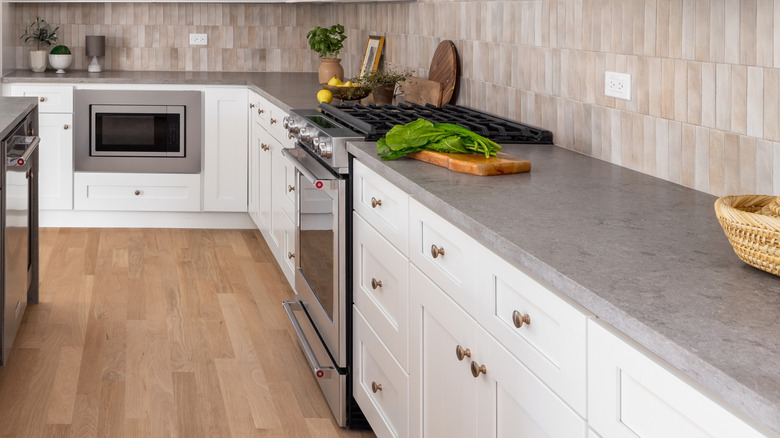The Stylish Kitchen Countertop David Bromstad Says Is Practically Indestructible
HGTV star David Bromstad never shies away from, well, anything, especially when it comes to a design trend he loves. The "Color Splash" host may be most well-known for his over-the-top personal style and love of all things bright, bold, and colorful, but he also has his fair share of opinions on other areas of interior design. When it comes to kitchens, one element he feels strongly about is the countertop, and he is a big proponent of quartz. On an episode of "," Bromstad said of quartz, "[It's] basically indestructible, you can put anything hot, cold, whatever on it." A bold claim from a bold guy. But is he right?
First, it's important to note that quartz is different from quartzite, another popular countertop material. Quartzite is a naturally occurring stone, while quartz is manufactured from crystals. Despite being engineered, . combines quartz crystals along with polymer resins and pigments at a ratio of around . The result is a beautiful, versatile, and highly durable countertop material. In addition to its strength, Bromstad undoubtedly appreciates the vast range of color, veining, and texture options quartz offers. Since it is manmade, it can be manufactured to resemble natural stone, or it can have a clean, uniform look. Still, it does have its limits.
Quartz is one of the strongest countertop materials, but still requires care
. Quartz even outperforms marble and granite in durability, ranking higher on the , which assesses scratch resistance. Quartz has a minimum Mohs score of seven, compared to three to four for marble, and six to seven for granite. The real advantage is that quartz is nonporous and therefore doesn't need to be sealed to stay stain and scratch-resistant.
Quartz is also known as being more heat-resistant compared to natural stone countertops, and is less prone to cracking or warping. Still, it's not completely heat-proof, and it's not wise to put it to the test to find out how much heat quartz can take. — placing a piping hot pan on the countertop straight from the oven can cause resin burn, resulting in an unsightly yellowish-brown discoloration. Resin burn can also occur just from leaving a moderately hot pan on the counter too long.
Durability aside, you also have to take care when cleaning the engineered stone, or you could unknowingly damage your quartz countertop with something as common as a Clorox wipe. it's a great choice to get the look and feel of high-end natural stone in your kitchen with a surface that's virtually indestructible.

